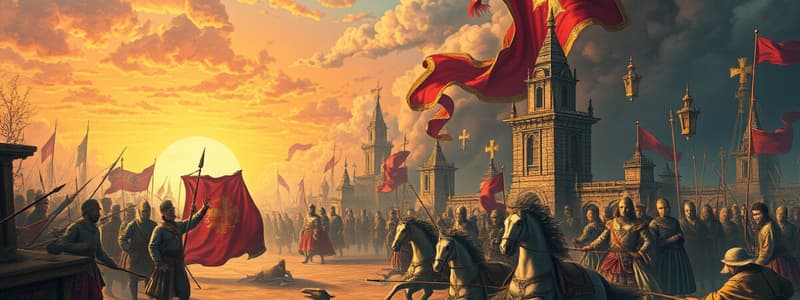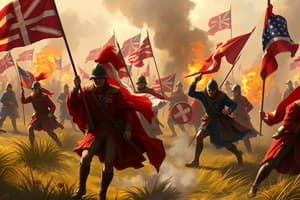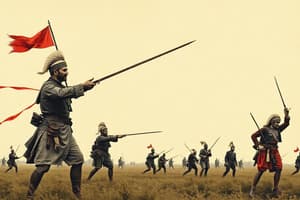Podcast
Questions and Answers
What was the Seven Years' War?
What was the Seven Years' War?
The first global war, also known as the French and Indian War, spanned from 1756-63 and was fought in Europe, India, America, and on the seas.
What countries were allied during the Seven Years' War?
What countries were allied during the Seven Years' War?
Britain, Prussia, and Hanover were allied against France, Austria, Sweden, Saxony, Russia, and later Spain.
What were the causes of the Seven Years' War?
What were the causes of the Seven Years' War?
The war was mainly caused by the antipathy between Britain and France, along with hostility between Prussia and Austria.
Who appeared to be winning the war until 1758?
Who appeared to be winning the war until 1758?
What were some relevant events that occurred in North America prior to the Seven Years' War?
What were some relevant events that occurred in North America prior to the Seven Years' War?
In the early years of the war, what forts did the French capture?
In the early years of the war, what forts did the French capture?
Who took control of Louisbourg in 1758, and what events followed?
Who took control of Louisbourg in 1758, and what events followed?
What happened after the Battle of the Plains of Abraham? Did the French make any efforts to retaliate?
What happened after the Battle of the Plains of Abraham? Did the French make any efforts to retaliate?
How important was the British Navy in the Seven Years' War?
How important was the British Navy in the Seven Years' War?
What was the Treaty of Paris?
What was the Treaty of Paris?
Why was the Seven Years' War important?
Why was the Seven Years' War important?
What effect did the Seven Years' War have on the Indigenous Peoples of Canada?
What effect did the Seven Years' War have on the Indigenous Peoples of Canada?
Flashcards are hidden until you start studying
Study Notes
Overview of the Seven Years' War
- First global conflict, lasting from 1756 to 1763, known as the Seven Years' War or the French and Indian War.
- Battles fought across Europe, India, America, and at sea.
Alliances Involved
- Major conflict between Britain and France led to the formation of two alliances.
- Britain allied with Prussia and Hanover.
- France aligned with Austria, Sweden, Saxony, Russia, and later Spain.
Causes of the War
- Rooted antipathy between Britain and France, focusing on imperial and economic competition.
- Tensions also existed between Prussia and Austria, contributing to the broader conflict.
- Britain aimed to diminish France as an economic rival, while engaging in overseas attacks on French colonies.
Early War Developments
- France initially gained the upper hand, benefiting from support in Canada and from Indigenous Peoples until 1758.
- British capture of Louisbourg marked a turning point, leading to victories in Quebec City and Montreal.
Pre-War Conflicts in North America
- Antagonism between French and British began in 1754 over Ohio Valley territory.
- Notable British success included the capture of Fort Beauséjour in 1755.
French Gains in Early 1756
- French forces under Marquis de Montcalm captured British Fort Oswego, securing Great Lakes control.
- French also captured Fort William Henry.
British Capture of Louisbourg
- Louisbourg fell to British forces in summer 1758, granting access to the St. Lawrence River.
- British victories began to dominate following this critical event.
Aftermath of the Battle of the Plains of Abraham
- Montcalm's death post-battle led to Chevalier de Lévis taking command.
- Lévis briefly retook Quebec in spring 1760 before British reinforcements reversed this.
Role of the British Navy
- Crucial in protecting colonies and securing victories at Louisbourg and Quebec.
- Prevented potential invasions from Spain and France.
Outcome: Treaty of Paris
- Officially ended the Seven Years' War on February 10, 1763.
- Resulted in Britain gaining control over New France.
Significance of the War
- Treaty reshaped Canadian identity with the establishment of bicultural values.
- Reduced French influence allowed colonists to recognize their military independence, setting the stage for the American Revolution and influencing Canadian Confederation.
Impact on Indigenous Peoples
- Most Indigenous Peoples sided with France during the war.
- The Royal Proclamation of 1763 established reserves for Indigenous Peoples, giving them autonomy over unsold lands.
Studying That Suits You
Use AI to generate personalized quizzes and flashcards to suit your learning preferences.




